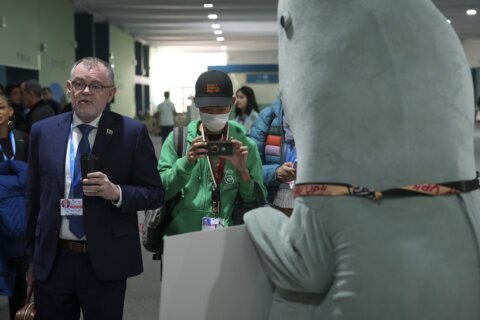ISLAMABAD (AP) — The Taliban’s repressive control over women and girls in Afghanistan is unparalleled and will jeopardize the country’s future, the U.N. rights chief warned Monday.
Volker Türk said new morality laws that ban women’s voices and bare faces in public, along with sweeping bans on education and most jobs, were outrageous and amounted to systematic gender persecution.
“I shudder to think what is next for the women and girls of Afghanistan,” Türk told the U.N. Human Rights Council in Geneva. The Taliban were not immediately available for comment.
The Taliban — who took over Afghanistan in 2021 during the final weeks of U.S. and NATO withdrawal — have excluded women from most areas of public life and stopped girls from going to school beyond sixth grade, despite initial promises of a more moderate rule.
They are also restricting women’s access to work, travel and health care if they are unmarried or don’t have a male guardian, and punishing those who don’t comply with the Taliban’s interpretation of hijab, or Islamic headscarf.
The Taliban last month issued the ban on women’s voices in public under new laws approved by the supreme leader in efforts to combat vice and promote virtue.
“I want to make clear my abhorrence of these latest measures, which include forbidding even eye contact between women and men who are not related and imposing mandatory covering for women from head to toe, including their faces,” Türk said.
Taliban policies are propelling Afghanistan further down a path of isolation, pain and hardship, he added.
Last year, the U.N. Office for the Coordination of Humanitarian Affairs said the country needs $4.62 billion in aid for nearly 24 million people in need. The Taliban takeover drove millions into poverty and hunger after foreign aid stopped almost overnight.
Sanctions, a halt on bank transfers and frozen billions in Afghanistan’s currency reserves restricted access to global institutions and the outside money that supported the country’s aid-dependent economy before the withdrawal of U.S. and NATO forces.
The situation for children was especially devastating, with 12.4 million children in desperate need, Türk said, but a massive shortfall in funding was “sharply undercutting” the response by the U.N. and its partners.
Another speaker at the council session was Richard Bennett, the U.N. special rapporteur on the human rights situation in Afghanistan. Bennett has frequently criticized the Taliban’s treatment of women and girls. Last month, he confirmed he was no longer allowed to visit the country.
In his first address since being barred from Afghanistan, Bennett said the morality laws reinforced the Taliban’s institutionalized system of sex and gender discrimination, segregation and oppression and affected almost the entire population.
“Unaddressed, the repercussions will shape future generations,” he said.
Bennett said he had talked to Afghans in several provinces who had described a visible increase in the presence of morality inspectors as well as tightening restrictions, in particular on people’s freedom of movement.
“We have also received information that barbers are instructed not to shave men’s beards shorter than the specified length, while the ban on broadcasting of images of human beings is impacting the media,” he said.
Afghan media have reported that the Vice and Virtue Ministry has stopped female journalists from working in Daikundi province and administered a religious test to government employees, warning they risk dismissal if they do not participate.
There have also been reports that the state-controlled broadcaster RTA has stopped airing in Kandahar province, the Taliban’s power center in the south and the base of its leader Hibatullah Akhundzada, because morality laws prohibit the depiction of living beings.
The Taliban have not responded to requests for comment on the reports.
Copyright © 2024 The Associated Press. All rights reserved. This material may not be published, broadcast, written or redistributed.







